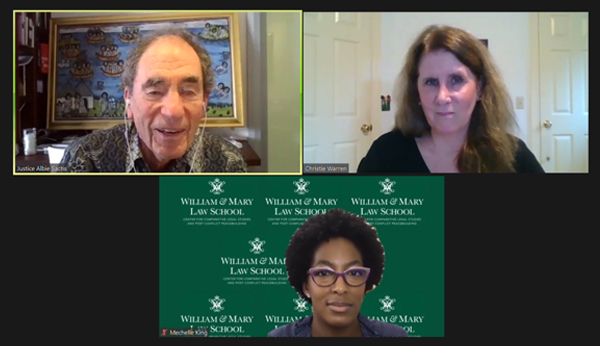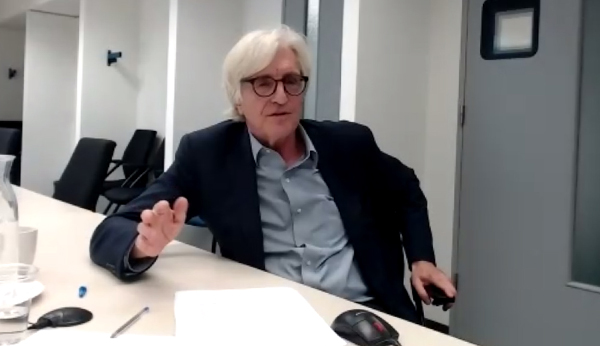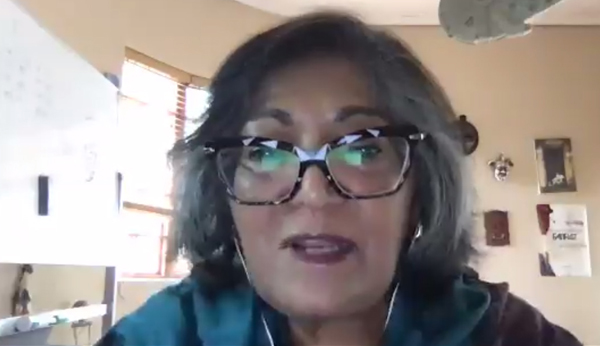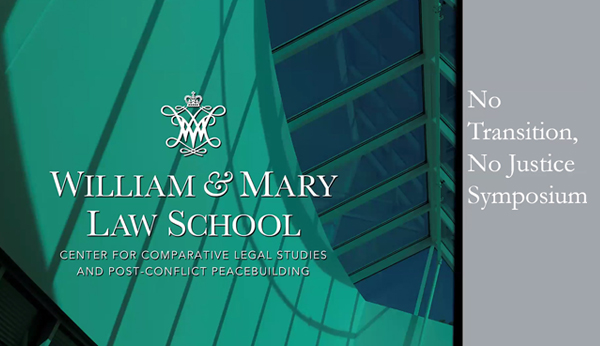William and Mary Law School Hosts Symposium on Transitional and Racial Justice
“Should I accept an invitation to have coffee from the man who tried to kill me by planting a bomb under my car?” Albie Sachs, activist and former judge on the Constitutional Court of South Africa, asked a global audience of almost 400 pre-registrants.
With this provocative question, the September 18 symposium “No Transition, No Justice: How the Absence of Transitional Justice following the Civil War Has Led to Ongoing Racial Injustice in the United States” began.
The event, which was held online due to the COVID-19 epidemic, was hosted by the Law School’s Center for Comparative Legal Studies & Post-Conflict Peacebuilding and co-sponsored by the Center for Racial and Social Justice, the W. C. Jefferson Chapter of the Black Law Students Association and the Reves Center for International Studies.
Over the course of a full day, international and domestic experts, academics and activists discussed pathways from conflict to peace and explored linkages between the United States’ failure to engage in transitional justice at the end of the Civil War and current racial inequities that continue to plague the country.
 David Tolbert, former President of the International Center for Transitional Justice, and Yasmin Sooka, who served as Deputy Chair of the Human Rights Violations Committee on the South African Truth and Reconciliation Commission, reflected on aspects of transitional justice that included prosecution of perpetrators of violence and discrimination, the role of truth commissions, the controversial issue of amnesties given to war criminals in return for crucial evidence, the need to retrain security forces, recovery of assets and awarding of reparations.
David Tolbert, former President of the International Center for Transitional Justice, and Yasmin Sooka, who served as Deputy Chair of the Human Rights Violations Committee on the South African Truth and Reconciliation Commission, reflected on aspects of transitional justice that included prosecution of perpetrators of violence and discrimination, the role of truth commissions, the controversial issue of amnesties given to war criminals in return for crucial evidence, the need to retrain security forces, recovery of assets and awarding of reparations.
“Power never moves without pressure,” Tolbert stated, while Sooka, citing post-World War II philosopher Karl Jaspers, compared criminal guilt, political guilt, moral guilt and metaphysical guilt, each of which must be dealt with by societies coming to terms with their responsibility for enabling and promoting violence.
“Forgetting itself is guilt,” Sooka said.
The thread of transitional justice was picked up by domestic experts and woven throughout the history of the United States.
 Professor Peggy Cooper Davis of NYU School of Law called for the involvement of more historians and fewer lawyers in the process of reanalyzing post-Civil War reconstruction.
Professor Peggy Cooper Davis of NYU School of Law called for the involvement of more historians and fewer lawyers in the process of reanalyzing post-Civil War reconstruction.
“The United States has never come to grips with its legacy of slavery,” Davis stated. “Instead we deviated onto a path of denial and obfuscation.” Current failures to make international conventions federally self-executing and instead delegating responsibility for enforcing human rights norms to local governments continue to undermine equal protection of law, she said.
“I wish I could feel more hopeful about the future,” Davis concluded.
 Walter Riley, an attorney who has been active in the Civil Rights movement since growing up in the Jim Crow South, recounted the lengthy history of discrimination and violence against Black people in the United States. Since transitional justice most often accompanies restructuring of government and institutional power, he questioned whether the time is right to begin such a process.
Walter Riley, an attorney who has been active in the Civil Rights movement since growing up in the Jim Crow South, recounted the lengthy history of discrimination and violence against Black people in the United States. Since transitional justice most often accompanies restructuring of government and institutional power, he questioned whether the time is right to begin such a process.
“I don’t know if it is possible to discuss reconciliation before power has shifted,” Riley stated. He advised today’s youth to “organize, be part of a collective advocating for change; the work you do is more important than the compensation you receive.”
 Dr. Rex Ellis, former Associate Director for Curatorial Affairs at the National Museum of African American History and Culture and current Chair of the 400 Years of African American History Commission, reminded the audience of the importance of memory.
Dr. Rex Ellis, former Associate Director for Curatorial Affairs at the National Museum of African American History and Culture and current Chair of the 400 Years of African American History Commission, reminded the audience of the importance of memory.
Memorializing truths – even terrible truths, he stated – is necessary to create new levels of hope and not wallow in the painful past. Weighing in on the debate about the preservation of monuments, Dr. Ellis stated, “We can’t cherry pick among parts of our history. Confederate monuments should be removed but preserved as evidence of the open sores in our past.”
Two politicians spoke about their recent initiatives to implement transitional justice in the United States.
 Asheville City Councilmember Keith Young discussed his July 2020 Resolution to apologize and provide reparations to Black residents for his city’s role in slavery, discriminatory housing practices and racist policies implemented throughout its history. The Resolution, which passed unanimously, aims to embed systemic solutions in the form of increasing minority home and business ownership, career opportunities and strategies to grow equity and generational wealth.
Asheville City Councilmember Keith Young discussed his July 2020 Resolution to apologize and provide reparations to Black residents for his city’s role in slavery, discriminatory housing practices and racist policies implemented throughout its history. The Resolution, which passed unanimously, aims to embed systemic solutions in the form of increasing minority home and business ownership, career opportunities and strategies to grow equity and generational wealth.
 A statement from Congresswoman Barbara Lee (D-CA 13th District) concluded the program. In June 2020, Lee introduced a Resolution calling for the creation of the first United States Commission on Truth, Racial Healing and Transformation to address effects of slavery, institutional racism and discrimination against people of color and ways in which our history continues to impact laws and policies today. In support of the Resolution, the late Representative John R. Lewis stated, “This resolution moves our country in the right direction of establishing a model and process to explore, expose, confront and reconcile the truths of our past so that we may create a more just and equitable future for all, not just a select few.”
A statement from Congresswoman Barbara Lee (D-CA 13th District) concluded the program. In June 2020, Lee introduced a Resolution calling for the creation of the first United States Commission on Truth, Racial Healing and Transformation to address effects of slavery, institutional racism and discrimination against people of color and ways in which our history continues to impact laws and policies today. In support of the Resolution, the late Representative John R. Lewis stated, “This resolution moves our country in the right direction of establishing a model and process to explore, expose, confront and reconcile the truths of our past so that we may create a more just and equitable future for all, not just a select few.”
 William & Mary Law School Dean Benjamin Spencer closed the symposium on a note of hope, recognizing that truth commissions have recently been formed in Boston, Minneapolis, Providence, San Francisco, Detroit, Greensboro, Maine, Maryland and Iowa. Academic institutions, including Georgetown University and William & Mary, have also begun to come to terms with their own legacies of slavery.
William & Mary Law School Dean Benjamin Spencer closed the symposium on a note of hope, recognizing that truth commissions have recently been formed in Boston, Minneapolis, Providence, San Francisco, Detroit, Greensboro, Maine, Maryland and Iowa. Academic institutions, including Georgetown University and William & Mary, have also begun to come to terms with their own legacies of slavery.
“Truths need to be told and reparations made before we can all move forward,” Spencer stated. Speaking to law students in the audience, Spencer quoted Nelson Mandela: “Slavery, discrimination and poverty are not natural states; they are created by humans and can be eradicated by humans. Sometimes it falls on a generation to be great. You can be that great generation. Let your greatness blossom.”
“This symposium shows that we can listen and learn – from members of our own communities and those further away – as we come to terms with difficult issues facing our country,” said Professor Christie S. Warren, founding Director of the Center for Comparative Legal Studies & Post-Conflict Peacebuilding. “We are grateful for the wisdom of these international and domestic experts as we embark on our path to truth and reconciliation.”
Addendum: More than three fourths of the audience members who responded to Justice Sachs’ question voted that he should have coffee with the man who planted the bomb under his car. Albie, as he prefers to be called, said this would be an act of transcendence, not forgiveness.
About William & Mary Law School
Thomas Jefferson founded William & Mary Law School in 1779 to train leaders for the new nation. Now in its third century, America’s oldest law school continues its historic mission of educating citizen lawyers who are prepared both to lead and to serve.
